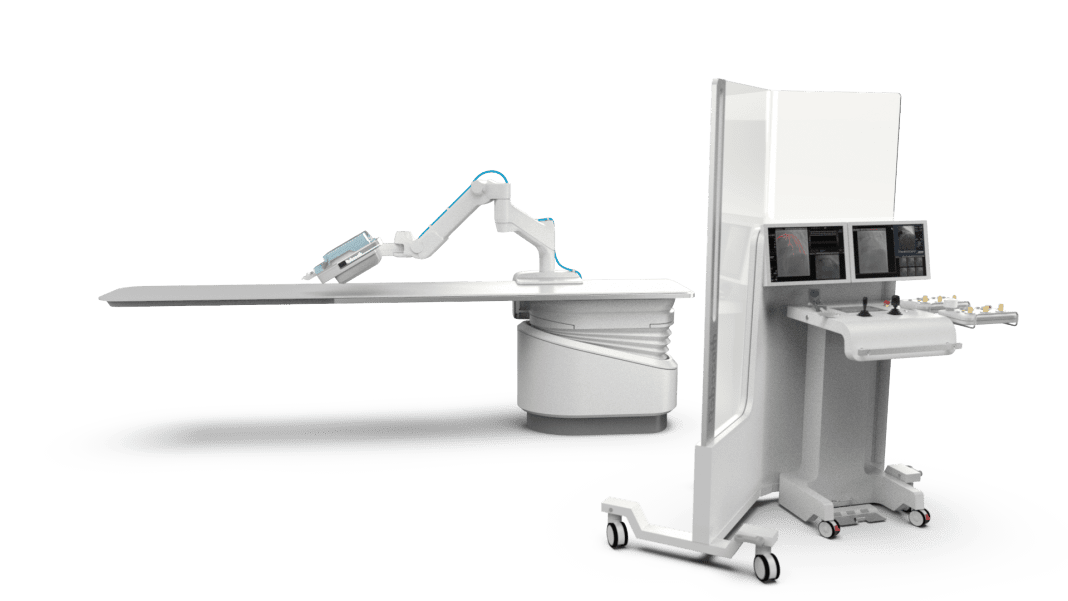First remote robotic-assisted coronary angioplasty has been successfully completed in Europe. The procedure was carried out by Prof. Eric Durand and Prof. Rémi Sabatier at the Rouen Medical Training Center and Caen University Hospital in France – spanning 75 miles (120 km) between the two locations.
The procedure is the first of its kind in Europe; it was completed with R-One™, Robocath’s first commercial robotic-assisted platform. This unprecedented achievement opens the door to new options for patients who live in remote areas and require swift treatment to successfully treat cardiovascular diseases.
The first remote robotic-assisted coronary angioplasty procedure was carried out on an animal model on December 8, 2020. Consistent communication between Prof. Sabatier – operating in the Caen University Hospital, and Prof. Durand – based at the Medical Training Center in Rouen, was secured using a variety of tools.
Prof. Rémi Sabatier, Interventional Cardiologist at the Caen University Hospital and Associate Professor in Remote Medicine said: “There are still significant disparities in the level of care for cardiovascular diseases depending on where a patient lives. For example, in Europe, 40% of heart attacks are not treated with a coronary angioplasty, even when this is clearly a better option for the patient than fibrinolytic therapy. This is essentially because it takes too long to get to an interventional cardiology center.
This pioneering robotic procedure, the first in Europe carried out at a distance of over 70 miles, could eventually improve patient care in case of serious cardiac events such as heart attacks and strokes, and save lives. Aside from the technical achievement, it’s been a privilege for me personally to be involved in this first intervention. The equipment provided by Robocath meant that I was perfectly able to communicate with my colleagues in Rouen without a hitch. Operating my tools remotely felt exactly the same as a standard robotic procedure.”
Regarding the first remote robotic-assisted coronary angioplasty: Prof. Eric Durand, Interventional Cardiologist at Rouen University Hospital said. “I’m delighted to have participated in this landmark operation, which has proven that long-distance robotic procedures can be completed safely and securely by qualified caregivers. There are a number of challenges that still need to be overcome before this can become commonplace within this sector, particularly in relation to the required personnel training and legal liability. Nonetheless, I’m convinced that the future of interventional cardiology is robotic and that this remote connection module will speed up growth in this area.”
Bruno Fournier, CTO at Robocath said: “This successful operation is a great proof-of-concept in a number of technical aspects; it demonstrates that a coronary angioplasty can be completed safely between two distant sites. In the long run, our goal is to provide the user with the same level of performance as with an in-person robotic procedure.”
Discussing the Regarding the first remote robotic-assisted coronary angioplasty: Robocath CEO Lucien Goffart said: “Cardiovascular diseases are currently the number one cause of death worldwide. In part, this is due to a number of circumstances that make it hard to improve treatment, such as geographic, structural and economic factors. Ensuring equality of treatment and access to care – regardless of where one lives, is fundamental. Robotic interventional medicine unquestionably represents a reliable response to these major social challenges. Firstly, robotic procedures make vascular intervention safer for the physician, by providing complete protection from X-rays; over the last 15 years, X-ray exposure has had a significant effect on the number of qualified people entering this field. People are less available, less willing to train, because of the health conditions caused by wearing lead equipment. This has resulted in a growing shortage of qualified medical staff. Secondly, remote robotic interventions will provide patients with rapid access to the best treatment by experts, who can operate from a specialist center on a patient located at a smaller ER.”
Philippe Bencteux, President and Founder of Robocath, said: “When I founded this company, almost ten years ago, my ambition was to develop robotic solutions for remote treatment in order to improve care for patients suffering from serious heart conditions such as strokes, heart attacks and hemorrhagic shocks. This telerobotic intervention represents a major triumph for public health. It will clear the way for better treatment for a significant majority of the population – who have not had access to it before. Almost twenty years after the first surgery was carried out between two different locations: New York and Strasbourg, I am particularly proud that Robocath has achieved this ‘first’ in remote vascular intervention. It is a key step in developing the field and will soon lead to a new global era in interventional treatment.”



